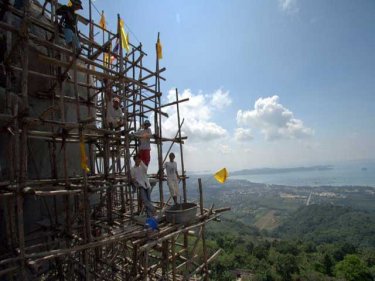The idea, already being termed the ''Phuket model,'' will enable Burmese to register and be given an ID from local administrators at Provincial Hall.
Employers will be responsible for making sure their workers go to be fingerprinted and photographed as part of the ID process.
The decision to introduce the new system appears to be a breakthrough that could reduce the need for illicit labor on Phuket, and possibly also minimise human trafficking.
The Burmese workers will have to have health checks, and make social security and health contributions at a higher rate than Thais.
Burmese illegals have always been seen as a drain on the Thai system. On Phuket, Burmese workers are obliged to obey an 8pm curfew and forbidden from using mobile telephones or motorcycles.
Construction company bosses have been urging the change because their needs have not been diminished by the world economic downturn.
Phuket Governor Wichai Praisa-Nob has given his approval to the ''working visa'' idea and says the problem had been a big one for Phuket.
The process was a kind of ''pardon'' for the construction and fishing industries, and it could bring huge change, he said.
Once the national government approves the ''working visa'' Phuket model in a Cabinet meeting, it will become the first of its kind in Thailand.
Last week a 25-member investigating Labor Commission, headed by Phuket MP Laywat Areerob, heard about the problems of Phuket in meetings at Provincial Hall.
A decision to rapidly implement the concept to meet the island's needs quickly emerged.
At present, 29,000 registered Burmese work on the island under a quota system that has been criticised for years as inadequate.
Construction companies have made the point that they keep illegal Burmese workers in small camps of up to 30 families, so that if discovered, their labor losses and fines are minimised.
It would be more effective for administration and health to have the workers in larger camps, the official inquiry was told last week.
A form of temporary work-based ID for Burmese has been in use in the northern border town of Ranong, capital of the province of the same name.
There, the Burmese population is of such a size that local supermarkets have signage in Thai, English and Burmese. Burmese even run their own underground schools.
At this stage, the ''working visa'' concept will only apply to the construction and fishing industries, and a date for its introduction depends on a Cabinet decision.
The plight of illegal Burmese and Rohingya boat people has received attention since the suffocation of 54 Burmese in a container truck in April last year and reports in January of brutal ''push-backs'' from Thailand in which hundreds died.
Phuket Still Hungry for Burmese Workforce
Latest Construction on Phuket is not being slowed by the economic downturn and thousands more Burmese laborers are required, a Parliamentary Labor Commission hears
Phuket Still Hungry for Burmese Workforce
Human Trafficking: Suffocation, or Solution?
LatestDesperation drives Rohingya, Burmese and others into the hands of human traffickers, putting their lives on the line. The Bali Process this week may provide answers that Thailand needs.
Human Trafficking: Suffocation, or Solution?
Thailand's UN Pledge: No More Boat People Deaths
Photo Album No more pushing back the boats: that is the guarantee extracted from Thailand by the UN as an international body looks at human trafficking and its tragic outcomes.
Thailand's UN Pledge: No More Boat People Deaths





What does this mean:'' and make social security and health contributions at a higher rate than Thais.'' Do farangs also make higher contributions?
Posted by VFaye on April 27, 2009 09:50